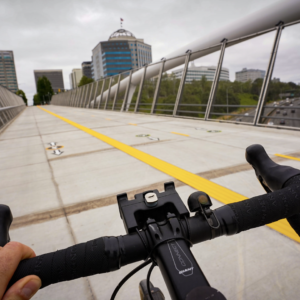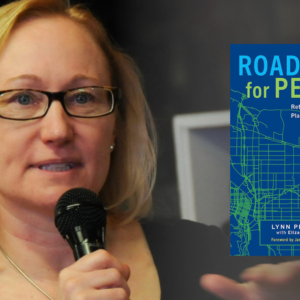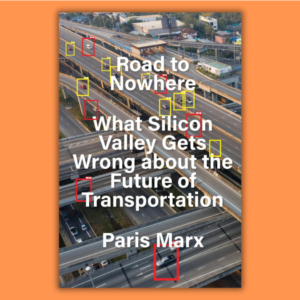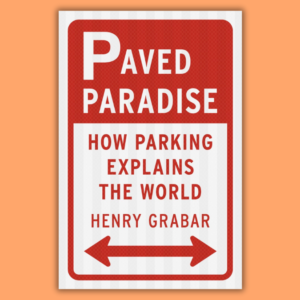
Publisher’s note: Despite a recent BTA survey showing that 90% of respondents own a car, many people are finding that living without one (or several) is not only possible but enjoyable. Even the New York Times has noticed that in America, people are falling out of love with cars.
On that note, here’s a review of a very highly recommended book about how to take the carfree (or just car-light) plunge. It was originally published by Elisa Munoz on her Birmingham, Alabama-based blog Bike Skirt, and has been republished here with her permission. We’re looking forward to publishing more reviews from Munoz in the future.
I have been hearing all about how Chris Balish’s book, How to Live Well Without Owning a Car (Ten Speed Press, 2006) is the foremost manual on how to live car-free no matter where you live. I am here to tell you that it is true. This book rocks.
Balish starts by laying out exactly how much car ownership is costing you, and our society as a whole. I found that angle, as opposed to the “Save the Earth” approach, to be oddly refreshing. Let’s be honest, most people care a hell of a lot more about their bank account than their carbon footprint. I sold my car, so I was already rid of that cost, but was still stunned by how much a car truly costs. A chapter on how to sell your car takes the fear out of that, which I can tell you is scary.
This book is a must-read for anyone who is carfree, thinking of going carfree, has a daughter who has recently gone carfree (Mom — I am looking at you!), or thinks anyone who has done it is a freak.
The book goes on to list all the reasons cars are bad (pollution, road rage, global warming, unwalkability of cities, etc) in a fair and un-tedious way. Again, refreshing and un-preachy. The next few chapters were the most helpful: how to get to work without a car. Balish covers all the bases, talking about biking, transit, carpooling, walking, motorcycling…even inline skating! The advice is simple and well thought out. Real life examples pepper the pages, telling of suburbanites and city dwellers who went carfree for a multitude of reasons and have found success.
Balish also realizes that not everyone can do such a dramatic thing, and suggests going car-lite, an idea that I think most Americans would be more likely to get behind (until they realize how awesome it is and give up their cars completely!). A one week trial period and a weekend dry run are also suggested, making the whole thing less daunting.
Wondering how to get groceries, meds, shoes and diapers without a car? All covered in this book that I am now calling my “non-drivers manual.” Tips on arriving fresh and maintaining good hygiene are also covered, and I found the ideas to be right on track. Dating without a car scare you? Check out Chapter 22.
This book is a must-read for anyone who is carfree, thinking of going carfree, has a daughter who has recently gone carfree (Mom — I am looking at you!), or thinks anyone who has done it is a freak. The stories are genuine and infectious, the ideas are helpful and realistic and the writing is engaging. I have a feeling I will be referring to this book often in the days to come and loaning it out to friends. A quick and helpful read to be sure.
Thanks Chris Balish, you have taken the mystique and fear out of living a carfree life in a car-centric culture.
You can find the original version of this review here.
You can find more books about bikes, livability, and carfree issues in the BikePortland Bookstore. And you can benefit the local economy in any number of ways when you buy any books from Powell’s website via the links on our site.







Thanks for reading.
BikePortland has served this community with independent community journalism since 2005. We rely on subscriptions from readers like you to survive. Your financial support is vital in keeping this valuable resource alive and well.
Please subscribe today to strengthen and expand our work.
Boy howdy I’d love to be car-free. The only thing holding me back is that I’d like a different job and I don’t know where I’ll land location-wise in the metro area. I bike to work now and I suppose it’s just a matter of selling my vehicle and adapting from there as things happen.
But I wonder if the car companies would be asking the gov’t, and therefore us taxpayers, for more bailouts if too many people tried to give up cars.
Step One: Uh, stop owning a car?
Step Three: Profit!
Please mail my royalty checks to jeanyus@inanity.org.
Nick V,
let the car companies ask for bailouts!… and let us, the people, elect politicians with the backbone to say no.
My family and I have lived car free for three years now. In fact we chose Portland in part because we felt it was one of the few places in America where it was possible to live car free. What started as an experiment has now become such an ingrained part of our life that the thought of buying a car seems less and less desirable or even relevant. If I never have to own a car again I will be very happy. A combination of bicycles, buses and Zipcar/rentals has us more than covered for our transportation needs. The only time I miss owning a car is for that spontaneous drive to the coast/mountains with the family but otherwise our lives have been immeasurably enhanced and enriched by ditching the automobile.
Just to put things into perspective: for what it cost us to own, run and maintain two vehicles back in L.A we could afford forty car rentals a year! Here in Portland even in a busy year we never even come close to spending a quarter of that on all our transportation costs (mass transit, bicycle upgrades, maintenance & purchase, Zipcar & car rentals).
For all those committed cyclists who still cling to their cars…….give it up, you have nothing to fear but fear itself!
I just ordered the book via the bikeportland bookstore. Glad to help support the site in this way.
Jonathan,
Seeing “politicians” and “backbone” in the same sentence made me blackout for a second.
Michael #4,
I’m forwarding your comments to my wife. Those are the words we both need to hear!
I have weighed the question of car ownership myself numerous times and I have a hard time making the economics work out. If you are a normal consumer of the “car ownership lifestyle” involving bank loans, gas stations, and mechanics, then automobiles can be very expensive to own and operate. However, that is not the only way to roll. I have bought most of my cars over the years for less than I have spent on some of my bikes (some were given to me by people who didn’t have time or energy to fix them). Just like fixing bikes, fixing cars is a rewarding hobby and a means of getting cheap transportation and making friends. Here is the approximate rundown of monthly costs for my current vehicle (purchased for $500):
Insurance $55
Fuel – free veggie oil + ~$15 biodiesel
Oil changes and maintenance (amortized) ~ $40
Parking once in a while downtown~ $20
Bi-annual registration (including BTA plate divided by 24 months) ~ $5
So for less than $150 / month, I have the freedom to go to the coast, up to Seattle, or out to the Gorge whenever I want, as well as carry things weighing up to 1000 pounds. Zipcar costs minimum $7 / hour or $56/ day. While I bike to work every day, I cannot justify giving up such a good deal of personal vehicle ownership yet. However, I give props to those who do decide to go carless, and am happy to help them out when they need a motorized vehicle. By the way, I fully support increasing vehicle registration fees for motorized vehicles, they are way too cheap!!
JV #7
You are correct…..if I had the time, inclination & requisite skills to maintain a car the economic equation would change. Unfortunately (or maybe fortunately?) I don’t and I think many car owners are in the same boat. I also think your own costs would alter dramatically if you started to commute by car regularly. Fingers crossed you never get painted into that corner.
My wife and I are 30 and have never had a drivers license. We’re from Vancouver Canada and now in Portland. Both cities have such good public transit that it can be done. Yes you make sacrifices, but gain many more positive experiences. I recently started biking to work instead of taking the MAX..nothing beats cruising by Widmer in the morning and smelling them brewing beer. Ahhhh…bliss.
Does the book have a section on how to sell your car in a poor economy without losing your shorts?
After cross crusade in astoria we are gonna try much harder to sell our car.
great review! You highlighted the part of the book that most spoke to me when I read it a few years back – which was the true cost of owning a car. It helped me make the case to my wife (who, at the time, thought I was crazy) for selling my car. I used his formula in the book to show her how much we were *really* spending a year on the damn thing. That’s all she needed to see – and we worked out a deal: I would sell my car (one of the two cars we owned at the time) and spend *half* of what we saved a year on bikes. I told her I’d get a Zip-car account if we needed to (which still would have been cheaper than owning that car) but we never needed to. So we never did.
Three years later, that pesky credit-card debt that we could never quite get rid of is all gone. We haven’t once *Not Once* missed my old car. And she even got a little jealous of my car-light lifestyle and asked for an Xtra-cycle to get her and the kids around town and to school… which she uses far more than the car these days.
(and I have 5 bikes now – it’s AWESOME!)
—
One thing I didn’t like about this book, were the number of Balish’s suggestions for how to live car-free that involved getting your friends with cars to drive you around when you needed one. In his defense, I don’t think there was any such thing as Zip-car when he wrote this. But I’d still like to see him update it with more creative suggestions than just being a freeloader to your friends.
—
@ #11 poser,
Personally I hate driving and try to get out of it whenever possible even though I have a car. Perhaps a fair trade for “freeloading” a car ride is a six-pack or some other sign of appreciation. Maybe alcohol is an inappropriate gift for a driver, but something along those lines would still be cheaper than owning a car….
i read this book a while ago. i’d already figured out biking to work, zip-car for errands, borrowing cars from time to time, mass transit, and so on, but the best thing in the book for me (that the reviewer doesn’t mention) was the idea of using RENTAL cars for trips to the coast. it had simply not occurred to me.
but i also agree with #7, it is way more convenient owning a car and car ownership has me looking for ways to make the car pay for itself. I originally picked up the book because i was thinking about purchasing a 94 toyota pickup from my brother who was giving me a screaming hot deal. I said no for a month while he tried to figure out what to do with it, but finally I said yes when my friend rolled through town in her pickup, having the time of her life with a truck that has as much character as she does herself.
I still bike to work and all around portland (although a foot condition has me driving more recently), but for my family vacation in Montana nothing could have been sweeter than taking my truck. Though i sometimes still imagine my truck runs on the blood of innocents. I may go car free sometime again in the future.
Thanks for the kind words everyone and the great discussion.
I live where there is no zip car, so often do end up asking friends for rides. One trick is to offer to take their car for service it needs (oil changes, tire rotations, etc) in exchange for using the car for the day. They get it done without the hassle (oh, they pay for it, btw) and I get a car for the day. Take them and pick them up from work and you are golden. Just an idea I have made work in a zip car less, bad public transport, mountain to get to the suburbs, no bike infrastructure place!
The chapter on renting cars was the nail in the car coffin…also had not occurred to me. I actually took advantage of it last weekend to visit family.
Nick V #12: I’m with you brother. driving makes my toes curl. I can’t think of a less palatable waste of time than sitting in a car.
I’m with you on the barter system too. my neighbor has a pick-up truck, and I have a lot of tools. he has free reign to borrow any of my tools, and once or twice a year I borrow his pick-up. then we just drink beer.
—
JV #7:
Sure it may not weigh out if you have a car running on biodiesel / veggie oil, thats a given. I traded my car for the Tour de Fat bike trade around three months ago and I have not once looked back.
Before:
$60/month insurance
$100/month for gas
$15/ month oil changes, etc.
This doesnt include when my fuel pump went up $600, or when I needed new tires $300, or my slipping transmission that worried me everyday.
Since:
$200 for a rainsuit
$50 lights, tubes, grease, etc.
But I feel its the intangibles that are the best reasoning for getting rid of the car, I bike 6 miles each way to work and find myself not needing coffee in the morning (or at least not as much.) I have lost weight, quit smoking cigarettes, met some new friends and riding buddies, and saved some money. But I didnt do it for the money, I did it to experience everything on my commute and trips everywhere, the sights, sounds and smells of Portland. I have even biked to the coast since trading in my car, and not once have I been limited to do something carless, although the IKEA trip with my trailer was interesting to say the lest.
If you need further reasoning to quit driving just sit and watch McCloughlin during the morning commute and just watch peoples faces and expressions. Then go sit on CLinton and see how different all the commuting bicyclists look in the morning. Car-free is not for everyone but it sure is for more people than they realize.
Noah #17 –
You are definitely right that there are many intangible social benefits associated with biking, and I think those are what make my daily commute to work by bike so rewarding. It is also faster to bike than to drive downtown at most times during the day.
Congrats on making the Tour de Fat trade, and it sounds like it was definitely the right move for so many reasons. I really don’t think I could ever do it…
Part of the problem is that once you have a network of friends who are car enthusiasts and have helped eachother on projects over the years it is difficult to abandon it all completely. I always seem to have one or two project vehicles in the works. The same is true with many friendships which are partially based around bike assistance and events. It sure would be equally hard to give up biking.
That said, on the topic of borrowing – I have to admit I am sometimes a little wary about lending my truck to friends who rarely drive. I would rather personally drive them on their errand to pick up a load of lumber and concrete than spend an afternoon replacing a clutch (again).
I read this book shortly after I went carfree in July. But I did have concerns with this book. One the writer as little more experience with bikes than I. Two he doesn’t have to haul around two cats to the vet, a rabbit to the vet or even a 70 pound dog to the park or other adventures I’d like to include my dog. Thirdly I didn’t always like his attitude in the book, it seemed to me that he came off a little elitist at times, and last but not least to me is the fat that he still shops at Sam’s Club aka Wallmart, and I just don’t get it. He toots the horn of health and environment and yet can’t find a co-op or locally owned store to frequent? He still relies on his friends driving him to Sam’s Club? Ugh! Other than that there were a few great resources but I’m waiting for the next and better carfree book to come out!
I bike to/from work year-round, but still can’t see going carless: how would I get up to Mt. Hood for powder days?
Really doesn’t work to try to pick up a rental car when you need to be on the road at 7, and Zipcar is $$$.